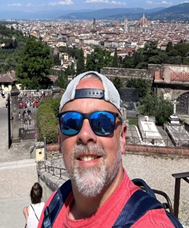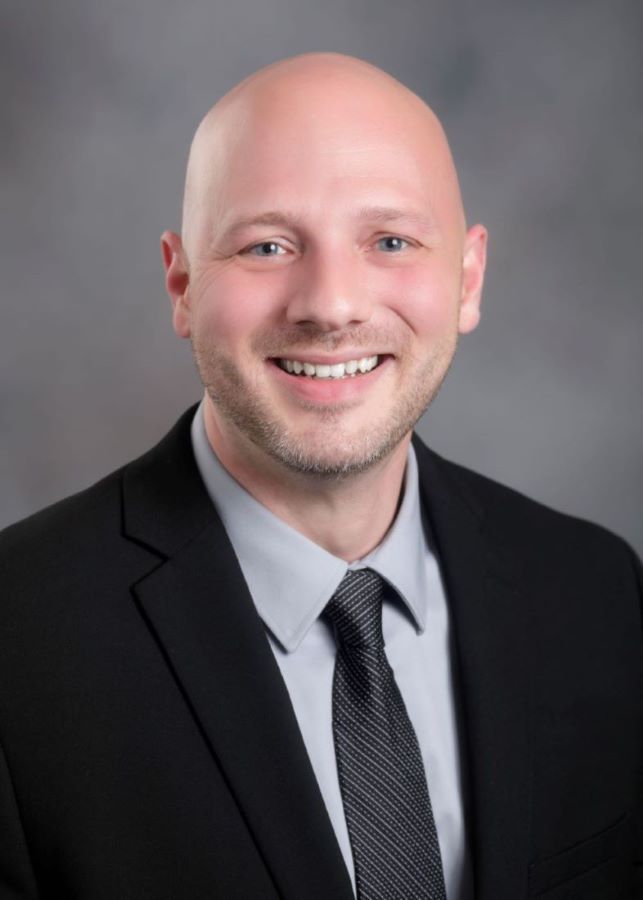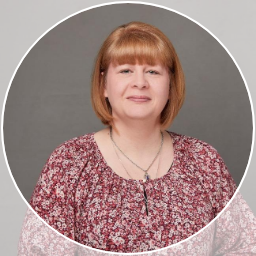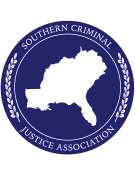Second Vice President

Shaun Thomas
University of Arkansas
Personal Statement I’m proud to be a Lifetime Member of the SCJA with nearly a decade of commitment to the association. I have served the association in several roles over the years, most recently as a director-at-large, and now I am seeking your vote for me as the SCJA 2nd Vice President. My priority areas in running for 2nd Vice President include: (1) continuing to foster, support, and champion translational research, academic-practitioner collaboration, and making evidence-based changes in local communities; (2) increasing diversity, equity, inclusion, and belonging (DEIB) among our membership and, of course, (3) continuing to make SCJA and our annual meetings congenial, supportive, fun, and unpretentious for students, academics, practitioners, and community leaders / partners.
I came up through sociology and it wasn’t until I was an Assistant Professor in a CJ program that I was introduced to SCJA. Like many graduate students, I was told to prioritize attending large national conferences and that’s what I did for quite some time. However, my colleagues began to show me that true relationships, mentorship opportunities, friendships, and partnerships were often best fostered by participation at more intimate meetings such as that of the SCJA. After attending my first SCJA meeting, I realized what they meant. While large national meetings can be a whirlwind of presentations and meetings, my experiences at SCJA were less intimidating, more supportive, unpretentious, and fun. SCJA meeting are perhaps the only “work events” in which people’s life partners actually want to join them! I quickly learned it wasn’t just work as usual at SCJA meetings but rather a more supportive environment in which you were welcomed as a true friend and equal, even part of the family. Heck, I’m an LSU alum and even the Florida folks welcomed me! During my first SCJA meeting, I forged what have become longtime partnerships and friendships. If I am elected to 2nd Vice President, I will work to bring that type of experience to more people in more disciplines, particularly underrepresented students, faculty, and practitioners.
Another area in which the SCJA play a critical role and which I will continue to support and develop is fostering academic-practitioner collaborations and making evidence-based changes in local communities and agencies. Like many of you, my experiences during the Covid-19 pandemic forever altered my career trajectory as I gained perspective on exactly what kind of work on which I want to focus and the impact I hope it may have. For me, that meant focusing my efforts on developing and strengthening partnerships with community organizations and using my abilities to assist them in meeting their DEIB goals, securing external funding to serve their communities, evaluating their efforts, and helping them to make evidence-based changes in their agency and local community. I was uniquely prepared to do this because SCJA had long been a community that valued and supported translational research, facilitated practitioner-researcher partnerships, and enhanced mentorship across all types of career trajectories (teachers, researchers, practitioners). I was able to draw heavily on mentors and friends I made through SCJA to help me fulfil my desired career trajectory and, as 2nd VP, I would strive to bring these types of experiences and opportunities to more members.
My own life and work history shaped my goals and appreciation for the SCJA. I understand what makes the SCJA an exceptional professional organization and I am committed to continuing and expanding that tradition. If elected, I would make a concerted effort to endorse and promote translational research, researcher-practitioner collaborations, and make gains in DEIB among our membership.
Biographical Sketch Shaun A. Thomas is a Professor and Director of the Center for Social Research in the Department of Sociology and Criminology at the University of Arkansas. His research focuses on the sources of neighborhood spatial and temporal patterns in interpersonal violence, child maltreatment, social determinates of health, and health disparities. He has significant experience in academic-practitioner collaborations, assisting community partners and agencies in assessing and meeting their goals pertaining to diversity, equity, inclusion, and belonging, and as an evaluator of pipeline programs in higher education, mental and behavioral health programs, and criminal justice programs and initiatives funded by diverse federal, state, and local agencies. His recent publications have appeared in American Journal of Criminal Justice, Journal of Criminal Justice, Justice Quarterly, Homicide Studies, Deviant Behavior, and Crime and Delinquency.
Under his directorship, the mission of the Center for Social Research has been to address complex social issues and contribute to informed decision-making for public good by: (1) stimulating and supporting multidisciplinary collaborations; (2) pursuing sponsored research and conducting program and policy evaluations; (3) developing and providing access to quantitative and qualitative datasets and software; (4) equipping students with real-world research experiences and capacities; and (5) providing community partners with access to research and evaluation services, including research design, survey management, statistical consulting, qualitative research, data science applications, and analysis and reporting.
Treasurer

Molly Buchanan
Crime and Justice Institute
Personal Statement In 2012, I attended my first SCJA conference for my first ever academic presentation. I was still relatively new to Florida and a doctoral program. SCJA set the bar high for academic conference experiences. Since 2020, I have served in the SCJA Treasurer role, effectively managing expenditures and record-keeping both virtually/remotely and in-person. I look forward to continuing to serve the Association and membership whose genuine hospitality and friendliness remain unsurpassed. Through the Treasurer role, I can continue to meaningfully contribute to the SCJA’s continued growth and facilitation of professional development and fellowship. As an aside, I dig most things quantitative and am agonizingly detail-oriented – characteristics that have served me well in my current term as Treasurer. Thank you for considering my ongoing candidacy for SC]A Treasurer; it would be my honor to continue to serve the Association and its membership in this capacity.
Biographical sketch Molly Buchanan earned her Ph.D. in Criminology, Law and Society from the University of Florida; she is currently a Senior Data & Policy Specialist with the Crime and Justice Institute. In her work, Molly applies multidisciplinary perspectives to criminal justice realities with the goal of informing system policies and practices. Her peer-reviewed scholarship focuses on developmental, life-course topics particularly related to youth development and the different contexts that influence life outcomes. Her work has been published in refereed outlets such as Criminology, American Journal of Criminal Justice, Criminology & Public Policy, and Crime & Delinquency.
Director-at-Large (Choose two)

Rick Dierenfeldt
University of Tennessee, Chattanooga
Personal Statement I have been an active and engaged member of SCJA since 2019, having served as a member of the audit committee (2019) and awards committee (2022). I am also pleased to note that I have presented 7 student co-authored papers over this period, and that I have nominated numerous students and practitioners who have been recipients of annual awards presented by SCJA. It is my sincere hope that serving in the role of Director-at-Large will afford me the opportunity to be even more engaged within SCJA, represent the interests of our colleagues, and carry on the proud traditions of the finest regional organization in the field of criminal justice.
Upon attending my first SCJA conference in 2019, I was immediately impressed (and perhaps even at bit surprised) with the great care taken by our members and leadership to make our meeting and organization an environment that welcomed and served students, researchers, and practitioners. This approach fosters a level of collaboration, inclusivity, and professional/academic growth that is both unmatched in our field and imperative to its continued contributions to research and practice. As a Director-at-Large, my goal is to preserve this tradition while expanding on existing opportunities for student and practitioner success. An example of such an initiative is the development and implementation of a student research exchange that facilitates connections between our student members and faculty outside of their respective academic institutions. Should our membership be receptive, I believe this effort would culminate with numerous benefits for our student members in terms of research and publication, networking, and grad school/faculty recruitment. This initiative would likely be further enhanced through partnerships with criminal justice agencies and practitioners within our region, effectively linking these organizations with resources that might be otherwise unavailable. I am grateful to be a member of SCJA, and to have been nominated as a candidate for Director-at-Large. Our past and current leadership have established a blueprint for excellence, one to which I hope to further contribute as a member of the Executive Board.
Biographical Sketch Rick Dierenfeldt, Ph.D., is a U.C. Foundation Associate Professor of Criminal Justice in the Department of Social, Cultural, and Justice Studies at the University of Tennessee at Chattanooga, where he has served as a faculty member since 2018. Prior to joining the faculty at UTC, he was an Assistant Professor of Administration of Justice at the Wilkes-Barre campus of The Pennsylvania State University from 2016 to 2018. He earned his Ph.D. in Criminal Justice at the University of Arkansas at Little Rock in 2016. Before moving into academia, Rick spent over 10 years in the field as a police officer and criminal investigator in Missouri. His research has centered on violent crime, particularly firearm offending, and drug crime, as well as policy evaluation in the fields of policing and corrections. His most recent publications have appeared in such outlets as the Journal of Criminal Justice, Journal of Research in Crime and Delinquency, American Journal of Criminal Justice, Journal of Interpersonal Violence, and Victims and Offenders. He is currently completing the third year of a collaboration with the Chattanooga Police Department on the development, implementation, and evaluation of the Scenic City Crime Gun Intelligence Center, an effort funded through the Bureau of Justice Assistance (2020-DG-BX-0008).

Sheri Jenkins Keenan
Alabama A&M
Personal Statement The Southern Criminal Justice Association (SCJA) has a repetition for being the premier regional criminal justice association in the United States. As a lifetime member of SCJA, and an Associate Professor of Criminal Justice with 17 years in higher education experience and another 15 years experience as a practitioner, I believe I could combine my knowledge, skills, and desire to serve to continue to promote and advance this standing. I am interested in the Director-at-Large position because I want to be a part of this tradition, serve my discipline, and move the association I believe in and love into the future.
Biographical Sketch Sheri Jenkins Keenan, Ph.D. is an Associate Professor of Criminal Justice in the Department of Social Science at Alabama A&M University. Her research interests focus on policing special populations with an emphasis on juveniles: delinquency, mental illness, school safety, school-to-prison pipeline, gangs/threat groups, Racial, Ethnic Diversity (RE/D), Adverse Childhood Experience (ACEs), and juvenile justice program evaluation. Her publications deal with such areas as K-12 tracking, school violence, zero tolerance policies, juvenile mental health, juvenile drug courts, transfer/waiver, bullying/cyber-bullying, gang/threat groups, and several theoretical perspectives: labeling theory, social learning theory, social control theory, strain theory, and deterrence theory. Dr. Keenan has an accomplished grant record and her recently published book is titled The Transferring of America’s Youth (2021).

Brad Tracey
Volunteer State College
Personal Statement I woke blinking my eyes and being disoriented. I had been knocked unconscious in a hospital and was trying to regain my bearings. My friend was leaning over me asking if I was ok. I looked at him and stated, “I can’t move.” It was at this time, as a senior in college, that I realized how mortal I was. I was at a fundraiser for St. Jude Children’s Hospital in Memphis, and my friend and I had gotten a little competitive showing off. He was a cheerleader and I was also a college athlete. He started doing all kinds of flips and tricks that I just knew I could do. On one attempt of doing a backflip, I landed on my head and snapped my neck. Fortunately, I am fine now, but I have learned how fragile life can be and to make the most of it.
After several surgeries and physical therapy sessions, I realized how much of an impact people in service industries can have on a person’s life. Since then, I have devoted my life to serving others. My first career was in law enforcement. I was able to work several special details and help the community every day. I saw the best and worst of people in this career and I loved every second of it. People do not call police to tell them good job, and the response to the blue lights (police) is not the same as the red lights (Fire and EMS). There is a satisfaction that comes from helping others when they are at their lowest or when fear immobilizes them. Helping in these situations really hits home for service-oriented people.
Unfortunately, my neck issues resurfaced, and I had to retire from police work. One of the special details I liked the most was training officers, so I wondered if that love of teaching would translate into another career. I began teaching criminal justice. First in high school and then in college. While teaching I was able to continue learning and training and eventually received my Juris Doctorate. Teaching is also where I first came in contact with the Southern Criminal Justice Association.
I found the Southern Criminal Justice Association filled a major gap in educating the students of today with real world experiences. The membership of the organization is vast, and it promotes several different sectors in the criminal justice profession.
I am interested in holding this position at the Southern Criminal Justice Association because it provides me with a way to continue serving in an institution that provides a vital role to the profession. Helping form relationships with local entities while providing a network for students to learn about their careers is essential, especially in today’s environment. The Southern Criminal Justice Association promotes students to tackle subjects that are sometimes taboo to talk about. The research that students provide on the current issues in the field is essential. I want to help the students reach their potential and promote solution-oriented thinking to the issues that are important to the field of criminal justice.
Thank you for the consideration for this position. If elected, I plan on using my drive to serve and help students provide solutions to the problems in the criminal justice system. I am excited to use my networking ability with law enforcement and college to help better the field. I am excited that students are trying to problem solve the issues that justice faces today, and want to help serve them in finding solutions for the future.
Biographical Sketch Brad Tracy was born in Delaware in the mid 1970’s. He moved across the United States when he was younger, experiencing people and customs form several different regions. He settled down just outside of Nashville, Tennessee where he received his undergraduate degree in Political Science and Pre-Law from Austin Peay University. He continued his education pursuits earning a degree in law enforcement later that same year. Being a lifetime learner, he continued his education endeavors at Cumberland University earning his master’s in education and criminal justice and eventually his Juris Doctorate from Nashville School of law.
Mr. Tracy served the community as a law enforcement officer from 1999-2015. As a law enforcement officer he served on several special details and received many certifications for training and experience. Some of the training and certifications include Negotiations, Crisis Response, Gang Unit, CSI, Field Training Officer, Instructor Development, Motorcycles, DNA and Evidence Collection, Criminal Investigations, Incident Command, Community Policing, Homicide Investigations, Bomb Squad, SWAT, Dynamic Entry, Interview and Interrogation and Firearms Instructor. He used these trainings to serve the community by developing safety and security plans for Vanderbilt Children’s Hospital, Mass casualty exercises for the Nashville International Airport, and developing threat assessments for local high schools and colleges.
Brad Tracy is currently the Director of Criminal Justice at Volunteer State College. He has presented at several ACTE conferences concerning student certifications, project-based learning and Mass Casualty and Active Shooter response. He is a licensed attorney for the State of Tennessee, licensed security and dispatch instructor, and holds many certifications in train the trainer subjects for law enforcement. Mr. Tracy has consulted with Arne Duncan, the U.S. Secretary of Education under President Obama as well as with the governor of the state Bill Haslem. He developed the criminal justice program for all of the Nashville high schools and has consulted on several security details while serving in various roles.

John Weil
University of North Carolina Greensboro
Personal Statement As a relatively new SCJA member, I would embrace the opportunity as a Director-At-Large to contribute to the collaboration and exchange of ideas among my peers of justice-involved and criminal justice system professionals. I would assist in keeping members informed through the newsletter, seek input through surveys, and participate in the planning and execution of the annual SCJA conference, which is an excellent way for members to develop working relationships and share criminal justice research and practices.
I am open to new ideas that members may propose to stay connected or enhance communications. I also would work to keep students actively involved in SCJA as they progress in their studies and enter the workforce.
Biographical Sketch John Weil is a criminal justice policy expert who focuses on implementing durable solutions for crime deterrence, reduction, and prevention. As Director and Founder of the North Carolina Network of Safe Communities, he has spent the past 14 years working with law enforcement personnel, courts, social service agencies, elected leaders, and other partners to develop collaborative strategies aimed at breaking the cycle of violent criminal behavior and improving the safety of families and communities. He has led numerous initiatives across the State to provide training and technical assistance for customizing prevention and intervention approaches to the most pressing violent crime problems in a local area. Previously, John served as a State Program Consultant (child fatality reviewer) facilitating multi-disciplinary, multi-agency teams in 50 counties in North Carolina. He currently serves as a Field Liaison Officer to the North Carolina State Bureau of Investigation’s Information Sharing and Analysis Center. Additionally, John has co-authored numerous articles and reports on the use of data and evidence-based focused deterrence in the criminal justice system. John earned a B.A. in Political Science and an M.A. in Applied Arts and Sciences from the University of North Carolina at Greensboro.
